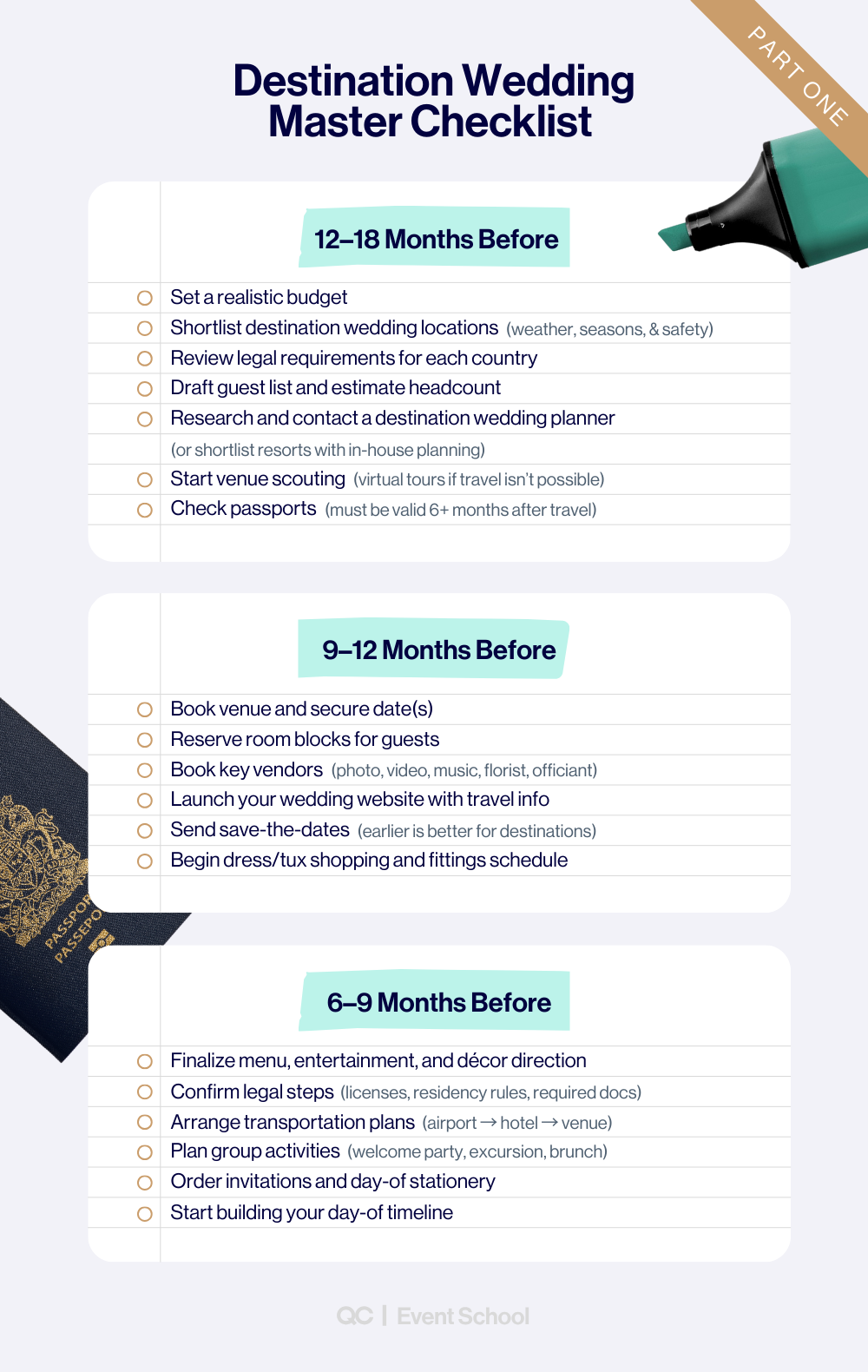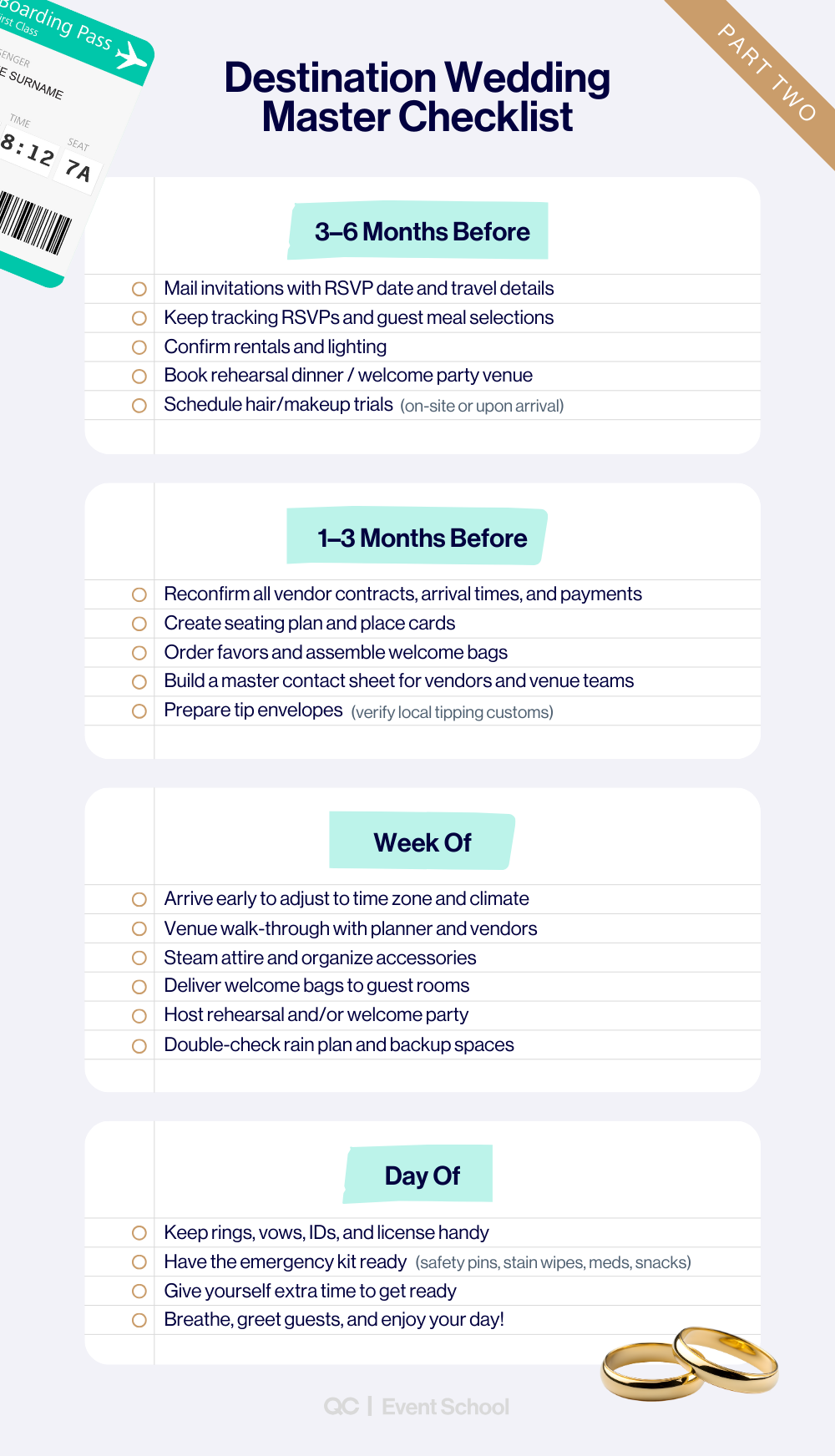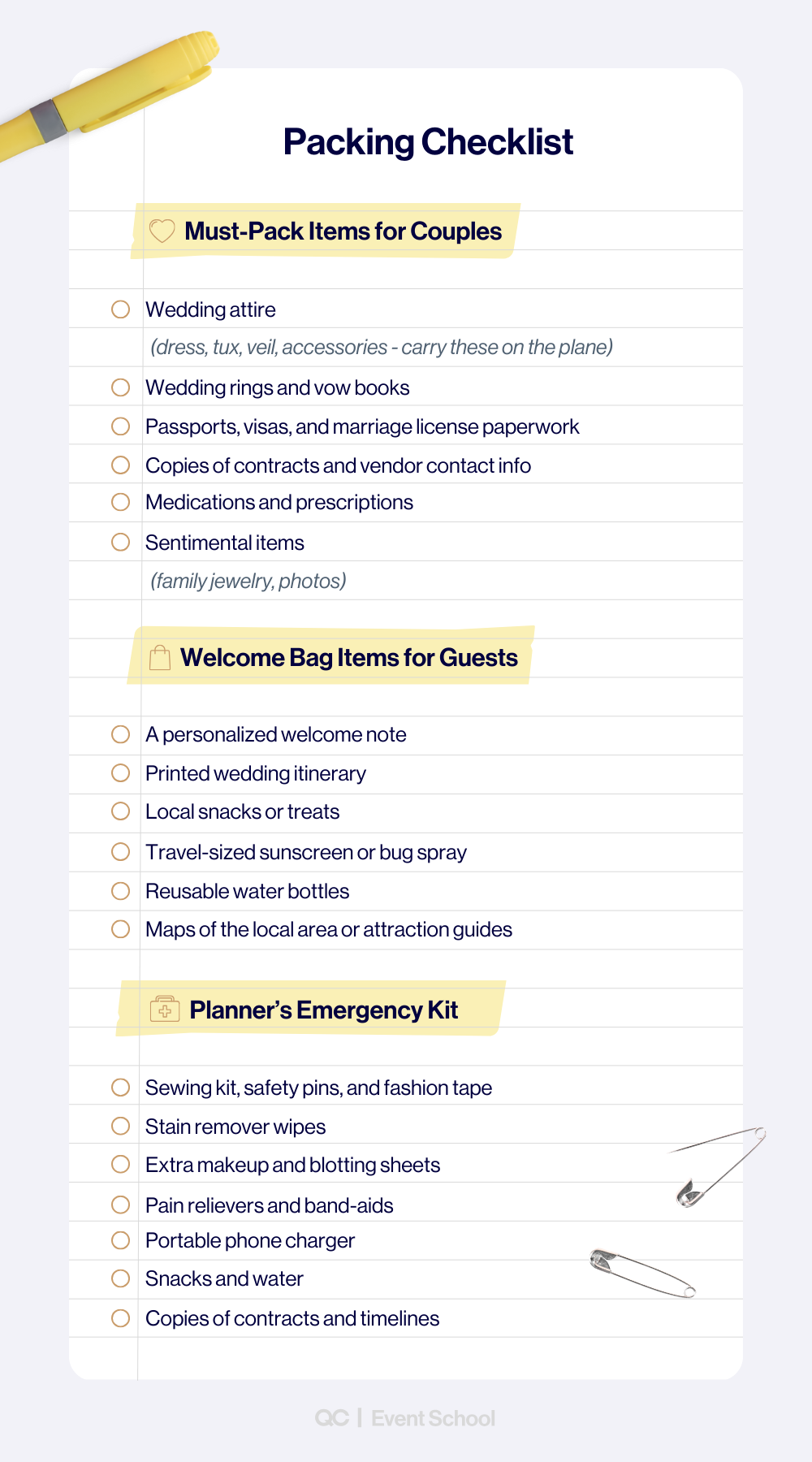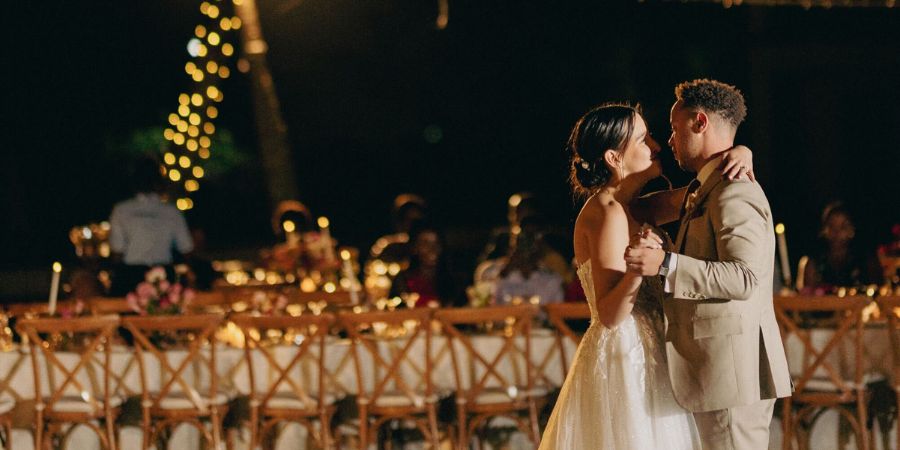
Business, Wedding Planning Tips, Your Event Career
How to Plan a Destination Wedding: The Complete Guide
How To Plan a Destination Wedding: Key Points
- Start planning a destination wedding 12–18 months in advance.
- Choose a location that fits your budget, vision, and legal needs.
- Hire a certified destination wedding planner for expert guidance.
- Keep costs low with small guest lists, off-season dates, and local vendors.
- Always prepare legal documents, packing checklists, and backup plans.
Introduction
Planning a wedding is exciting. Planning a destination wedding takes that excitement to a whole new level! Picture saying “I do” on a beach in Mexico, in a vineyard in Tuscany, or under the stars in Hawaii. Destination weddings create once-in-a-lifetime memories for couples and their guests.
But here’s the reality: destination weddings also come with unique challenges. Couples have to juggle travel, budgets, and legal requirements in another country. Planners need to master vendor communication, cultural differences, and logistics from afar.
In this guide, we’ll show you how to plan a destination wedding from start to finish. We’ll cover timelines, budgets, popular destination wedding locations, and insider tips from industry pros. Then we’ll dig into legal steps, money-saving ideas, packing lists, and pro advice you won’t find in most competitor guides.
👉 Keep reading to discover how to plan a destination wedding with confidence—from the first decision to the final toast.
Meet QC Event School Graduate & Luxury Destination Wedding Planner, Grace Johnstone

Photography by Manifester Brand ltd.
Grace Johnstone is a QC Event School graduate and certified International Wedding Planning Professional (IWPP)™, Destination Wedding Specialist (DWS), and Luxury Wedding and Event Specialist (LWES). Also trained as a florist through South Africa’s prestigious Mabel Flora Academy, she brings both creativity and expertise to every celebration.
Since founding her business Grace The Wedding Planner in 2015, Grace has designed and coordinated hundreds of events across Tanzania and beyond. Specializing in destination weddings since 2019, she creates unforgettable celebrations in Zanzibar, Arusha, Dar es Salaam, and Tanzania’s safari parks, while also drawing inspiration from her travels to South Africa, Dubai, Bali, Mauritius, and more.
With deep experience in multicultural weddings, Grace is known for blending global inspiration with local authenticity, ensuring every client feels like the true guest of honor.
The Complete Destination Wedding Timeline
Planning a destination wedding can feel overwhelming at first. There are flights to book, venues to compare, and legal documents to figure out—all on top of the usual wedding planning to-dos. That’s why most couples (and planners) want one thing above all else: a clear timeline that lays out what to do and when.
This master checklist gives you that roadmap. Whether you’re starting 18 months ahead or pulling things together in under a year, you’ll know exactly how to move step-by-step from “just engaged” to “just married”!
How Long Does It Take to Plan a Destination Wedding for Clients?
One of the first questions couples ask is: “How long does it take to plan a destination wedding?” As a planner, setting realistic expectations is crucial! And the answer depends on the client’s vision, budget, and location.
So, here’s a breakdown…
The Standard 12–18 Month Planning Timeline
Most planners recommend 12 to 18 months for a smooth destination wedding. This gives you enough time to:
- Research and secure the best venues.
- Lock in trusted vendors before they’re fully booked.
- Guide clients through legal paperwork, which can take months in some countries.
- Help guests save and plan for travel.
This longer timeline allows couples to enjoy the process without feeling rushed. It also gives planners time to anticipate and solve potential issues before they become problems.

Photography by Samantha Clifton.
Crash Courses: Planning in 6–9 Months
Sometimes, couples want to plan faster. A 6–9 month window is possible, but it requires careful organization. To make it work:
- Focus only on destinations with straightforward legal requirements.
- Choose venues and vendors with package options to save time.
- Encourage clients to keep the guest list small for easier logistics.
- Book travel and accommodations immediately to avoid last-minute price hikes.
While shorter timelines are exciting, they can also be stressful. Your role is to help couples prioritize what matters most and cut out unnecessary extras.
The Complete Timeline/Master Checklist: How to Plan a Destination Wedding Step-by-Step
No matter where you’re getting married, having a clear timeline is key. A destination wedding has more moving parts than a local event, so starting early will save you stress. Below is a step-by-step guide to help you stay on track.


Packing & Preparation for Couples and Planners
Packing for a destination wedding takes more thought than packing for a regular trip. Make sure you don’t forget the following essentials (again, feel free to save and print off the following checklists to use later!).

Having these on hand ensures the planner is ready for anything, from a last-minute wardrobe mishap to a vendor delay. Importantly, NEVER check your most important items. Always carry them on to avoid lost luggage disasters.
Why Choose a Destination Wedding? Pros & Cons
For many couples, a destination wedding feels like a dream come true. With that in mind, it’s important to weigh the benefits and the challenges. Knowing both sides will help you decide if this type of celebration is right for you.
Advantages for Everyone
There are many reasons couples choose a destination wedding. Here are some of the biggest perks:
- Built-in vacation. The wedding doubles as a trip of a lifetime for everyone involved.
- Smaller guest list. Fewer people are able to travel, which keeps the event intimate.
- Stunning settings. Beaches, vineyards, and historic cities double as natural decor.
- Memorable experiences. There will be so many opportunities to create unique memories that go beyond just one day.
- Flexible timing. There’s something for every time of the year—you just have to choose the destination wisely.
These benefits are why many couples say their destination wedding felt less stressful than a large traditional event.
Challenges to Plan For
Of course, destination weddings come with obstacles you’ll need to prepare for:
- Travel costs. Flights and hotels can be expensive for everyone involved.
- Legal requirements. Different countries have different rules for marriage licenses.
- Less personalization. Resorts often offer packages that may feel less custom.
- Language or cultural barriers. Communication can be tricky when working with local vendors.
- Unpredictable weather. Outdoor ceremonies in tropical or mountain regions need a backup plan.
The good news is that all of these challenges can be managed with the right planning—and especially by working with an experienced destination wedding planner!

Photography by Zanzibar photographer, @makande_jr7.
Planner Workflow: Tools & Systems to Stay Organized
No matter the timeline, using the right tools helps you stay on track. Here are some of the top recommended tools to help making the planning process easier:
- CRMs (Client Relationship Management tools) for communication.
- Project management software like Trello, Asana, and Aisle Planner for timelines and tasks.
- Shared online folders for contracts, invoices, and vendor details.
- Checklists and templates customized for destination weddings.
If you’re the professional destination planner, being organized not only makes your work easier but also builds trust with your clients.
Destination Wedding Locations: How to Pick the Perfect Spot
Choosing the right location is one of the most exciting parts of planning a destination wedding. That said, it’s also one of the most important decisions to make! After all, the setting will shape the budget, guest experience, and even the legal requirements for performing the marriage.
Let’s look at some of the most popular options…
Beach Weddings (Mexico, Caribbean, Hawaii, Bali)
Beach weddings are a classic choice! They offer stunning backdrops, relaxed vibes, and plenty of all-inclusive resorts. For instance:
- Mexico: Affordable packages, easy flights from the U.S., and breathtaking coastlines.
- Caribbean islands: Jamaica, the Bahamas, and St. Lucia are favorites for couples who want laid-back luxury.
- Hawaii: A U.S. option with tropical beauty and no passport needed for American guests.
- Bali: A further destination, but famous for its culture and jaw-dropping beaches.
Beaches are best for couples who want simple decor and a natural setting.
Vineyard & Mountain Destinations
If you love wine, fresh air, and dramatic views, a vineyard or mountain setting might be perfect.
- Napa Valley or Sonoma: Romantic U.S. options close to home.
- Tuscany or Provence: Iconic wine regions in Europe for couples who want timeless charm.
- South African winelands: A unique and adventurous choice with stunning landscapes.
- Colorado or the Alps: Mountain resorts ideal for active couples who love nature.
These venues offer built-in beauty and a cozy, elegant vibe that guests will remember.
City & Historic Venues
Some couples prefer the culture, architecture, and energy of a city or historic property.
- Paris and London: European cities full of romance and history.
- Charleston or Savannah: Southern charm right in the U.S.
- Marrakech or Bangkok: Exotic destinations with vibrant traditions.
- Castles in Scotland or Germany: Perfect for couples who want a fairy-tale wedding.
City and historic weddings often come with more vendor options, making personalization easier.
Spotlight: How to Plan a Destination Wedding in Mexico
Many couples specifically want to know how to plan a destination wedding in Mexico—and for good reason! Mexico is one of the most popular and affordable spots for U.S. couples.
Here’s why:
- Cost: Packages can start as low as $10,000–$15,000 for smaller weddings.
- Locations: Cancun, Riviera Maya, and Cabo San Lucas are top picks.
- Accessibility: Direct flights from many U.S. cities make travel simple.
- Vendors: Many resorts offer in-house planners, catering, and decor.
- Legal requirements: Couples will need passports, tourist permits (or a tourist card), and sometimes blood tests and/or vaccines. Some choose to do the legal paperwork in their home country first, then hold a symbolic ceremony in Mexico.
Mexico offers something for every couple, from budget-friendly beach resorts to luxury villas. Furthermore, it’s a flexible choice that can work for both small and large groups.
✈️ Become a Destination Wedding Planner!
Get trained, certified, and ready to book your first client in just 3 months, all while training at home with the help of QC Event School.
Budgeting for Destination Weddings (for Couples and Planners)
Money matters can be one of the biggest stress points for couples. So, having a clear plan in place ahead of time will keep everyone calm and aligned!
Average Destination Wedding Costs vs. Local Weddings
According to The Knot, the average domestic destination wedding costs around $39,000 USD, while an average international wedding is typically about $41,000 USD. Importantly, the expenses break down differently than those of a traditional local wedding:
- Travel and accommodations take up a larger share.
- Vendor fees may include extra charges for travel.
- Couples may spend less on decor since the setting itself is a “wow” factor.
- Guest counts are usually smaller, which lowers catering costs.
That said, destination weddings can still be very flexible—and sometimes more affordable than originally expected!

Photography by Michal Dzikowski.
Budget Breakdown Examples by Destination
Who doesn’t love numbers they can visualize? Here are some sample budgets to help you compare:
Mexico Beach Wedding (50 guests)
- Venue & catering: $10,000
- Travel & accommodations: $12,000
- Decor & flowers: $3,000
- Photography & entertainment: $5,000
- Legal fees & extras: $2,000
TOTAL: $32,000
Tuscany Vineyard Wedding (40 guests)
- Venue & catering: $15,000
- Travel & accommodations: $14,000
- Decor & flowers: $4,000
- Photography & entertainment: $6,000
- Legal fees & extras: $3,000
TOTAL: $42,000
Las Vegas Destination Wedding (30 guests)
- Venue & catering: $7,500
- Travel & accommodations: $6,000
- Decor & flowers: $2,000
- Photography & entertainment: $4,500
- Legal fees & extras: $1,000
TOTAL: $21,000
Having clear breakdowns makes the planning process transparent and builds trust.
How to Plan a Destination Wedding on a Small Budget
Many couples think destination weddings are only for the wealthy, but that’s not true at all! With the right choices, anyone can enjoy an incredible event without overspending. Here’s how to plan a destination wedding on a small budget while still keeping it both stylish and memorable!
Best Affordable Destination Wedding Locations
Some destinations are naturally more budget-friendly than others. Choosing the right spot can help you stretch the budget further:
- Jamaica: Offers all-inclusive packages that cover food, drinks, and even entertainment.
- Mexico: Cancun, Riviera Maya, and Puerto Vallarta are known for affordable resorts and package deals.
- Portugal: A hidden gem in Europe with lower costs than Italy or France.
- Las Vegas: Perfect for couples who want convenience and affordability with a dash of glamor.
Each of these locations has plenty of vendors and venues that cater to couples on a tighter budget.
Guest List & Venue Hacks
The guest count is one of the biggest budget drivers. Understandably, a smaller group means big savings. Here are some easy hacks:
- Invite only closest family and friends.
- Choose a mid-week wedding date for lower rates.
- Consider having the wedding during the off-season.
- Book venues that offer both ceremony AND reception spaces to cut down on costs.
- Look for all-inclusive venues that bundle food, drinks, and decor.
These steps not only save money but also make the event feel more intimate and personal.
Cutting Travel & Vendor Costs
Travel and vendor fees also add up quickly, but planners and couples can keep them under control with these strategies:
- Room blocks: Negotiate discounted hotel rates for guests.
- Local vendors: Hire florists, photographers, and musicians based in your destination. This avoids travel fees for U.S.-based vendors.
- Group travel deals: Work with airlines or travel agencies to get group discounts.
- DIY extras: Bring small items like stationery or favors with you, rather than ordering them locally.
These tips help couples enjoy their dream day without breaking the bank—and make the most of every dollar!
If You’re The Pro Planner Setting Professional Fees
If you’re new to destination wedding planning, setting your rates can feel overwhelming at first. However, pricing your services fairly is essential for building a sustainable career! Here’s how to start:
- Research the market. Look at what other certified planners in your region or niche are charging. This will give you a baseline.
- Consider your experience. New planners may start slightly lower, but avoid undercharging — your time and expertise have value.
- Decide on a pricing model. Many destination planners charge a flat fee, while others prefer a percentage of the wedding budget. Some offer tiered packages that scale with client needs.
- Factor in extra time and travel. Destination weddings require more hours than local events. Build these into your pricing.
- Be transparent. Clearly outline what’s included in your fee, so clients know exactly what they’re paying for.
By setting strong rates from the start, you’ll establish your value, attract serious clients, and avoid burnout.
Legal & Logistical Essentials You Can’t Overlook
Legal paperwork and travel logistics are some of the most overlooked parts of destination wedding planning. However, missing a step here can cause major stress. Avoid this by making sure you cover these essentials well in advance!

Photography by Owain George.
📱 Got Any Questions?
Book a call with QC Event School’s Support Team and get all the answers!
Marriage License & Residency Rules
Every country has its own rules for marriage. Some are simple, while others are more complex. For example:
- Mexico: Couples need passports, tourist permits, and sometimes blood tests.
- France: At least one person must live in the country for 30 days before applying for a license.
- Jamaica: One of the easiest destinations—paperwork is minimal, and couples only need to arrive 24 hours before.
If legal requirements feel too complicated, some couples choose to get married at home first, then hold a symbolic ceremony abroad.
Travel Documents, Visas & Vaccines
Travel prep is more than just buying tickets. Everyone traveling will need to confirm that they have:
- Passports valid at least six months past the wedding date.
- Any visas required for entry.
- Vaccinations recommended or required for the destination.
- Copies of all important documents stored digitally and in print.
This prep ensures smooth travel for everyone.
Insurance & Contracts
Destination weddings can involve big investments. Protect them with:
- Travel insurance for flights, hotels, and lost luggage.
- Wedding insurance to cover cancellations or vendor no-shows.
- Clear vendor contracts that spell out fees, deliverables, and timelines.
Oh, and don’t forget to check tipping customs in your destination as well, as they vary from country to country!
Anticipating Cultural & Vendor Challenges
A destination wedding offers exciting benefits that a local wedding might not always be able to offer. That said, it also comes with its own unique sets of challenges, too.
So, How Can You Prepare?
Here are some smart ways to overcome these common challenges:
- Language barriers: Hire bilingual vendors, use translation apps, or bring along a planner fluent in the local language.
- Cultural differences: Research local customs and traditions so you don’t offend or overlook important etiquette. Incorporate cultural elements into the wedding to honor the setting.
- Vendor limitations: Be flexible with decor, flowers, or rentals that may not be available. Work with local vendors who know the area’s resources and alternatives.
- Shipping restrictions: Instead of sending bulky items abroad, bring small essentials in your luggage and source larger rentals locally.
- Different business practices: Expect that contracts, payment schedules, or response times may differ from what you’re used to at home. Build in extra time for communication and confirmations.
By planning ahead and leaning on local expertise, you’ll reduce stress and keep the celebration running smoothly.
Final Tips for a Smooth Celebration
After months of planning, you want the wedding itself to feel joyful and stress-free. These final tips will help keep the celebration running smoothly.
Tip #1: Build in Buffer Time
Delays are common when travel is involved. Flights can be late, luggage can go missing, or weather can shift plans. By arriving a few days early and leaving extra time in the schedule, you’ll reduce stress and give yourself room to adjust.
Tip #2: Keep Guests Informed
Clear communication is one of the best ways to prevent confusion. Create a wedding website or group chat (WhatsApp works great for international trips). Share flight info, hotel details, event times, and even dress codes. The more your guests know, the smoother everything will go.
Tip #3: Stay Present on the Big Day
It’s easy to get caught up in details, but remember: this is about love and celebration. If you’re the happy couple and you’ve hired the help of a destination planners or day-of coordinator, let them handle logistics—that’s what they’re there for! Spend your time enjoying the moment with your new spouse and your loved ones.

Photography by Zanzibar photographer, Green Wedding Film.
The Benefits of Hiring a Destination Wedding Planner
As you’ve seen by now, a destination wedding is exciting, but it also comes with extra layers of planning. That’s where a destination wedding planner makes a HUGE difference! Whether you’re a couple preparing for your big day or someone exploring a career in this field, knowing what planners do shows why they’re so valuable.
What Destination Wedding Planners Really Do
Planners wear many hats. They’re not just schedulers; they act as problem-solvers, travel guides, and local experts. A professional destination wedding planner typically:
- Sources vendors in different locations around the world.
- Coordinates guest travel, accommodations, and group logistics.
- Manages multi-day celebrations, not just the wedding itself.
- Troubleshoots unexpected issues, like travel delays or language barriers.
- Provides local knowledge so couples can enjoy authentic experiences.
For couples, this means peace of mind and less stress. For aspiring planners, it highlights the wide range of skills you’ll use.
A great planner is flexible, detail-oriented, and always prepared for surprises. Their work ensures that couples can focus on the joy of their day, while planners build a rewarding career making these once-in-a-lifetime events possible.
Interested in Becoming a Destination Wedding Planner?
If reading about these responsibilities excites you, you might be ready to take the next step yourself! Becoming a destination wedding planner lets you combine event design, travel, and cultural experiences into a career that’s both creative and rewarding.
This path is so appealing because you’ll:
- Build a career helping couples plan once-in-a-lifetime celebrations.
- Gain the chance to travel and explore new destinations.
- Develop expertise in logistics, vendor management, and cross-cultural planning.
- Create a portfolio that sets you apart in the wedding industry.
Training and certification can give you the skills and confidence to get started. Many successful planners credit their education for helping them build trust with clients and secure their first bookings.
Why Certification Sets You Apart
Couples planning a wedding abroad want to trust their planner. Certification shows them you’re trained, credible, and serious. For example, QC Event School’s Destination Wedding Planning Course gives you step-by-step training in:
- Vendor negotiation across borders.
- Legal and cultural considerations.
- Logistics, timelines, and budgets.
- Marketing your services to international couples.

“QC had a lot more certification options than other event and wedding planning schools. They also offered more flexibility with my time and budget, and it helped that they have a bunch of great reviews! I will ALWAYS recommend QC Event School’s certification training to anyone interested in weddings and events.”
Afton Romrell
International Event and Wedding Planning Professional™ (IEWP™) • International Event Decorating Professional (IEDP)™
Ready to become a certified destination wedding planner? Learn more and enroll today with QC Event School—and start building the career you’ve always wanted.

Photography by Clemence Eliah.
How to Plan a Destination Wedding: General FAQs
Is a destination wedding cheaper than a local wedding?
Not always. A destination wedding usually costs between $39,000 and $41,000, while a local wedding in the United States will average around $36,000 USD in 2025. The difference is that guest lists are usually smaller for destination weddings, which can save money on catering and decor.
How long does it take to plan a destination wedding?
Most couples and planners recommend 12–18 months for a smooth process. This gives time to book venues, secure vendors, and complete legal paperwork. It’s also possible to plan in 6–9 months if you keep the guest list small and choose a destination with simple requirements.
How to plan a destination wedding in Mexico?
Mexico is one of the most popular destination wedding locations because it’s affordable and accessible. To get legally married in Mexico, you’ll need:
- Valid passports and tourist permits.
- Sometimes blood tests and/or vaccines (depending on the location and where you’re traveling from).
- Four witnesses with valid IDs.
Many couples choose to do the legal paperwork in their home country first, then hold a symbolic ceremony in Mexico to simplify the process.
Do couples pay for guest accommodations at a destination wedding?
No. Guests typically pay for their own flights and hotels. However, couples often help by arranging room blocks with discounted rates and sharing travel details on a wedding website.
How to plan a destination wedding on a small budget?
- Choose affordable destinations like Mexico, Jamaica, or Las Vegas.
- Keep your guest list small and intimate.
- Book off-season dates for lower prices.
- Use local vendors to avoid travel fees.
- Look for all-inclusive venue packages that cover multiple services.
Do I need a destination wedding planner?
It’s highly recommended! A destination wedding planner helps with:
- Navigating local laws and cultural differences;
- Negotiating with vendors;
- Coordinating guest travel and accommodations;
- Handling emergencies that arise abroad;
- And much more!
In a nutshell, having a planner means you can focus on enjoying your day without worrying about details.
Will my marriage be legal in the U.S. if I marry abroad?
In most cases, yes. For instance, a marriage performed overseas is valid in the U.S. as long as it was legal in the country where it took place. If your ceremony is only symbolic, however, you’ll still need to complete a legal marriage at home either before or after the trip.
As a destination planner, how do I find clients for destination weddings?
- Start with local couples going abroad.
- Partner with travel agents and resorts.
- Create destination-style shoots.
- Show your expertise online.
How should I price destination wedding planning services?
Research your market. From there, choose a model (e.g., flat fee, percentage, or tiers). Price for real hours and travel, and always be transparent.
Do I need certification to be a destination planner?
It’s not required, but it is strongly recommended. Being certified builds trust, shortens the sales process, and positions you as an industry expert in a competitive market.
💍 Learn How To Plan a Destination Wedding In As Little As 3 Months!
Earn your Destination Wedding Specialist (DWS) certification + designation right from home with the help of QC Event School.

